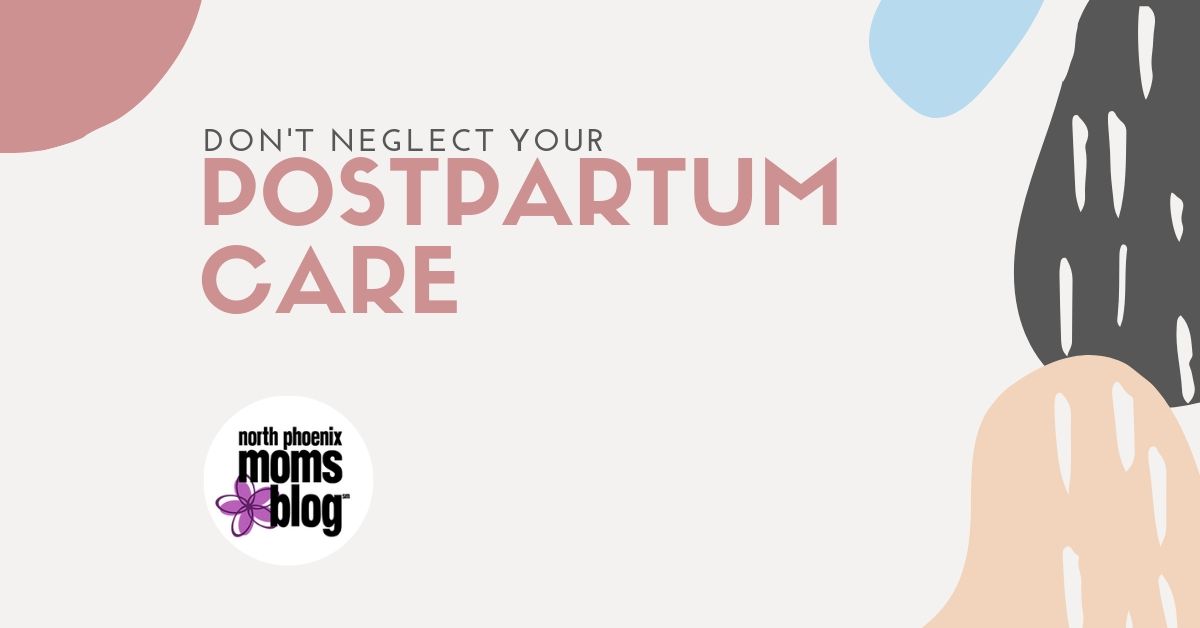No matter if it’s your first baby, or fourth, taking care of a new baby is difficult. Exhaustion, mom guilt, older siblings, and daily responsibilities tend to monopolize a new mom’s attention, putting her postpartum care on the back burner. One of the most important things I have learned, from the stories of others and my personal experiences, is not to neglect your postpartum care.
 There are many things that pop into one’s mind when hearing postpartum care. The ideas people are most often aware of are the mental aspects of postpartum care. Postpartum depression (PPD) and Postpartum anxiety (PPA) are the most commonly well known parts of postpartum care. Both PPD and PPA tend to last beyond the first few weeks and truly can inhibit a mom’s day to day mental state, making each day a struggle. Most new moms are vigilant to the idea they could develop either one, and are constantly on the lookout for signs and communicate worries with their doctor. However, some moms might be silently suffering from PPA or PPD and are having a hard time admitting it to themselves or others. This part of postpartum care is confusing for moms and leaves them wondering if they should seek treatment or if it’s just your typical baby blues.
There are many things that pop into one’s mind when hearing postpartum care. The ideas people are most often aware of are the mental aspects of postpartum care. Postpartum depression (PPD) and Postpartum anxiety (PPA) are the most commonly well known parts of postpartum care. Both PPD and PPA tend to last beyond the first few weeks and truly can inhibit a mom’s day to day mental state, making each day a struggle. Most new moms are vigilant to the idea they could develop either one, and are constantly on the lookout for signs and communicate worries with their doctor. However, some moms might be silently suffering from PPA or PPD and are having a hard time admitting it to themselves or others. This part of postpartum care is confusing for moms and leaves them wondering if they should seek treatment or if it’s just your typical baby blues.
Surprisingly, the less talked about postpartum care relates to taking care of your body physically. This is so much more than just letting your c-section scar heal or keeping an eye on postpartum bleeding. Minor issues can include, thrush, mastitis, hemorrhoids, headaches, swelling, itchy skin, hair loss, vision changes, night sweats, and much more. These issues seemed to be talked about way less, and are often only shared among women in private.
Some less common, and more serious physical issues, are postpartum eclampsia, hemorrhaging, pulmonary embolism, uterine or c-section scar infections, along with many more. These are things new moms are instructed to watch for based on symptoms that arise. Often those symptoms can stem from less threatening physical ailments or from exhaustion. Sometimes is it more than just being tired and not getting enough sleep. It is important for a new mom and loved ones surrounding her to keep an eye out for symptoms that may suggest these more serious postpartum effects and be in communication with a doctor. This is easier said than done and something I have personally experienced.
During the end of my first pregnancy I developed high blood pressure and was put on preeclampsia watch. I was induced at 38 weeks to avoid preeclampsia. My son and I were both doing well after a long induction and birth and were sent home. A few days later, I called my doctor after a bad headache that would not go away with medicine. I was instructed to head back to the hospital for monitoring. It was the last thing I wanted to hear. I had this new baby who badly needed me but I was reluctant to go to the hospital or even be away from him. After arriving and being assessed, I was admitted and treated for postpartum eclampsia. I cried harder than any time in my whole pregnancy. My mom guilt swept over me. How was I going to be away from my baby? How am I going to breastfeed him? I had heard the dangers of eclampsia and knew I needed to put that all aside to take care of myself. It was a miserable few days of treatment but I was glad I listened to my body and followed doctor’s orders.
This time around with my second baby I had the same worries and situation. High blood pressure, induction at 39 weeks, had a healthy baby, and then was sent home. Next came the headaches and even higher blood pressure. I almost didn’t even want to call my doctor or take medicine for fear of repeating everything from the last time. I kept the headaches to myself, dreading my husband finding out and forcing me to come face to face with the idea of going back to the hospital. I finally made the decision to share with my husband after realizing my kids needed me, and needed me healthy. So I canceled our family dinner plans and headed to the ER. Luckily, I was sent home with a new medicine and a follow up rather than being admitted. I was happy to get the treatment I needed which actually gave me piece of mind until my next doctor’s appointment.
So what can you do to help yourself, or a new mom, to make sure they are not neglecting their postpartum care? While it is common to ask a mom all about her new bundle of joy or the adjusting siblings, start by asking her how she is doing. Next, most new moms are aware of both the physical and mental postpartum issues but it is important for loved ones to learn about them too. Rather than diagnosing or asking invasive questions, loved ones can lend an ear, offer help, share experiences, and suggest they speak with their doctor. Postpartum care can be pushed to the side by new parents as they focus on the care and well-being of the new baby and their siblings. It is important to include the need for postpartum care and the benefit is has for you and your family. Even though the newborn stage can be difficult, taking care of yourself will only help make this trying time a little smoother.











